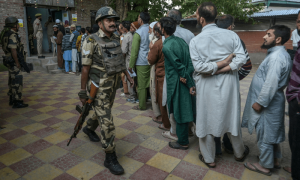The twentieth century was a dynamic epoch for ideology. Some of the most invigorating (and controversial) ideological experiments were conceived and implemented, reaching a peak in the 1970s. Twentieth century ideology was a product of Modernism a direct off-shoot of the ‘Age of Enlightenment’ (in Europe) where science and reason were established as primary systems of thought over superstition, organised religion, feudalism, and monarchism.
Rational humanistic ideologies such as Marxism/Communism, secularism, democracy, and socialism were all early products of Modernism that looked forward to a world powered by rational thought, science, and industrial development. Also emerging from these set of Modernist criteria was the concept of nationalism and capitalism that replaced monarchism and feudalism. By the early twentieth century, various Modernist ideologies clashed among themselves with the Marxists on one side trying to implement Marxism as a ‘scientific,’ economic and political system that would lead to equality and progress, and the bourgeoisie-driven capitalist democracies pushing forward their favoured system as a rational political expression against feudal exploitation, organised religion and dictatorship. This gave birth to the notion of social engineering, in which mass numbers of people were mobilised and hastily made to conform to the political and economic ideals of Modernism. This mobilisation did witness rapid industrialisation, scientific progress and social mobility, but at the same time the economic tensions and social ruptures it caused also resulted in certain disasters, such as the economic collapse in capitalist democracies (the United States and Europe), violent purges against millions of people in the communist world (Soviet Union) and the rise of fascism (in Germany and Italy). Modernism’s demise came sometime during the 1970s – a decade that saw the widespread intellectual revolt against the concept of the Modernist meta-narrative. The revolt was led by the so-called ‘post-modernists’ who began to render the all-encompassing nature of Modernist ideology as a destructive force. Post-modernists also attacked the implementers of Modernist ideology as being coercive agents of social and political engineering that suppressed the common wisdom and moorings of localised cultures. As post-modernist thought evolved, Modernist meta-narratives like Marxism, Fascism and colonial capitalism was gradually replaced by causes based on the genius of localised cultures. Anthropological sources replaced ancient written sources to determine history; an emphasis on pluralism and diversity became the focal point of democracy while multiculturalism overtook the notion of universalism and cultural homogeneity. So how did the Muslim world react to Modernism? Islamic Reformism (in the Modern Age): Modernist thought emerged when the Muslim world was facing a decline (in the eighteenth and nineteenth centuries). Its empires were collapsing and being run-over by European colonialism. Two strains of Muslim response emerged: The first advocated the absorption of Modernist ideas such as rationalism, science and ‘secular education,’ within the Islamic cultural fold. These reformists tried to prove (both, through historic as well as scriptural reasoning) that the essence of Islam was based on rational thought and action, and was also compatible with scientific study and progress. Keeping in mind Modernism’s emphasis on universalism, they began to see the Muslim people as a homogenous collection of people (Ummah). This strain of reformism gave birth to modern nationalistic movements (such as in Turkey), where the ‘decadent’ monarchical past was done away with and replaced by secular Turkish nationalism based on developmental economics. In places like Iran and Egypt regimes under Reza Phelvi and Gammal Nasser adopted Modernism’s industrial development models as well. This reformism was also witnessed (during the Ayub Khan dictatorship and the Z A. Bhutto regime), led by groups of people steeped in nineteenth century versions of modern reformist Islam in the subcontinent, and, in case of Bhutto (and Egypt’s Nasser), hybrid socialism. However, the reason this reformism when put into practice failed to revitalise the Muslim world was because although its implementers adopted Modernistic notions such as industrial progress and nationalism, they failed to implement those elements that help such notions sustain themselves politically and socially. For example, industrial development and modern education were attempted without allowing a vibrant democratic culture to prevail. This created dictatorships which were always venerable to becoming myopic and elitist at the first sign of economic and political failure. This happened in Iran (during the Islamic Revolution), Egypt and Pakistan (during Zia-ul-Haq’s regime) where the state based on modern reformist Islam, failed to implement related Modernist ideas like democracy. Consequently, in the event of the state’s economic and political failure, it turned inwards, replacing politics based on Modernist meta-narratives with a parallel meta-narrative formed by conservative Muslims. The second strain of reformism in the Muslim world that took place at the arrival Modernism advocated Islamic traditionalist thought as a reaction to Modernism. As opposed to using rationalism and contextual-ism to interpret religion and law, it encouraged the textual (literal) reading of the Quran and Shariah. It also rejected nationalism, claiming that nationalism is opposed to Islam which is universal and has no borders. This strain of reformism consequently gave birth to puritanical and radical ideas such as Wahabism and Salafia-ism – ideas that manifested themselves as thought and policies that rudely retarded reformist Islamic social and political discourse in countries like Pakistan, Egypt, Sudan, Algeria and Afghanistan, triggering the emergence of violent fundamentalist movements. Islamic Reformism in the ‘post-modern’ age, some suggestions: - While formulating Islamic laws, a rationalist and contextualist approach to Islamic sources should be taken, keeping in mind Islam’s core values, i.e. justice and mercy. - Purpose of Islamic legislation regarding punishments should be to reform people and not to exact revenge. - We should define Islam in such a way that it does not undermine its global standing.
- One cannot force someone to become a believer. - Islamic rules should always meet the following three criteria: Compatibility with reason; compatibility with the requirements of justice; compatibility with the requirements of (modern) times and people’s preferences. - Most current Islamic rules regarding women’s rights do not meet the criteria of either justice or rationality and therefore should be reformed. - No religious principal should be imposed by force, because Islam has declared that there is no compulsion in faith. - Democracy is the best system of government in today’s conditions. - Islam has neither proscribed nor prescribed a particular form of government. It only wants to ensure that governments, whatever their form, are based on justice. - Islam should not be identified with politics because political Islam has led to repression, disregarding the people’s constitutional rights and encouraging religion’s abuse for individual and group advantage. - Quran is a book of guidance. So neither fiqh (Islamic jurisprudence) nor government can force people to observe rules intended as guidance, because judgment, punishment and reward in this respect belongs to God. - All administrative and political matters are human affairs and hence, not subject to religious rules. -Religious extremism should be condemned. It is caused by: *exaggerating what is prohibited; * a literalist (textual) reading of religious sources; ignorance; and the myopic anathematization (denouncement) of so-called sinners that leads to intolerance, arrogance and self-righteousness. - Jihad is a means, not an end. It does not permit self-destruction and it does not legitimise killing civilians. - Preachers are spiritual guides, not judges (and vice-versa). - Islam and Islamic law should be understood and implied by each generation according to its own conditions. - The gates of ijtihad should be swung open. - Shariah was formulated according to conditions of a particular time and place. It is man-made. It needs to be updated, refreshed and revitalised through ijtihad and according to the needs of the time. - Power of Islamic legislation should flow back to the people from the hands of ulema, politicians and the clergy. - Islam is represented by the people not by political parties, organisations, or the clergy because Muslims commune directly with God. - The usage of hadith in legislation should be handled carefully and critically because many are unreliable and difficult to authenticate.
- A dynamic reading and understanding of Islam should be encouraged because a stagnant, conservative and traditionalist reading are against the spirit of the religion. - A lack of official clergy in Islam makes it most compatible with secularism. - Islam provides the ethical basis of a society, while government is based on rational premises. Thus, there is no need for the caliphate as a model for the exercise of power. - State/government has political functions; religious functions belong to the people according to their own will, need and consensus. - To avoid dictatorship, repression, state coercion and stagnation, Muslim political systems must not rest on theological foundations. - Everything under the unity of God is plural. There is only one God, but many kinds and types of Muslims. Nobody but God can determine exactly who or what a real or true Muslim is, and/or who or what a kafir or an ‘infidel,’ is.
Nadeem F. Paracha is a cultural critic and senior columnist for Dawn Newspaper and Dawn.com.The views expressed by this blogger and in the following reader comments do not necessarily reflect the views and policies of the Dawn Media Group.
Nadeem F. Paracha is a cultural critic and senior columnist for Dawn Newspaper and Dawn.com. He is also the author of two books on the social history of Pakistan, End of the Past and The Pakistan Anti-Hero.
He tweets @NadeemfParacha












































